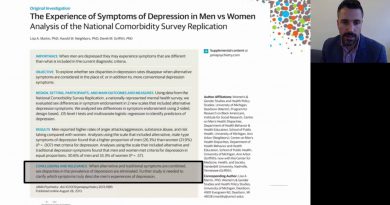Depression: The Male Silent Killer
Give yourself the gift of knowledge — subscribe to Big Think Edge: http://bit.ly/bigthinkedge
If you’re interested in licensing this or any other Big Think clip for commercial or private use, contact our licensing partner Executive Interviews: https://www.executiveinterviews.biz/rightsholders/bigthink/
Contrary to popular opinion, men are just as likely to suffer from depression than women—they just repress it, sometimes with fatal results.
Question: Are men less prone to depression as women?
Marianne Legato: The generally accepted statistic is that women are twice as likely to suffer from depression as men. I don’t think this is correct. I think that the signs and symptoms of depression in men are very different than those in women. In spite of great sadness and pessimism, men tend not to communicate their distress. They go it alone as they do in so many areas of their lives and they turn to self medication sometimes with excessive TV, excessive sexual activity, or excessive drinking as symptoms of their distress.
Marianne Legato: There’s no question that depression can be fatal in both sexes including, obviously, in men. People lose their appetite. They can’t sleep. They don’t take action against threats in the environment. And I think that there’s no question that depression, which by the way also depresses the action of the immune system and makes people prone to infection, is a very serious warning that a fatal outcome is a possibility. So depression should never be underestimated.
Marianne Legato: A very interesting thing about depression was commented on, in fact, by my father who was a physician years ago. When he said that the time to be most on guard against suicide is in the partially treated, depressed patient, he pointed out that when they’re profoundly depressed, they can’t take action even to end their own lives. But as they improve, they begin to see ways to carry out their very sad objective. And I think that that’s reflected in many of the warnings on some of our antidepressants, when we start to give them, result in the suicide of patients unexpectedly. And I think it may be to this general principle that the depressed patient in treatment has to be very carefully watched because there’s this time of special vulnerability.
Recorded on: November 4, 2009
Question: Are men less prone to depression as women?
Marianne Legato: The generally accepted statistic is that women are twice as likely to suffer from depression as men. I don’t think this is correct. I think that the signs and symptoms of depression in men are very different than those in women. In spite of great sadness and pessimism, men tend not to communicate their distress. They go it alone as they do in so many areas of their lives and they turn to self medication sometimes with excessive TV, excessive sexual activity, or excessive drinking as symptoms of their distress.
Marianne Legato: There’s no question that depression can be fatal in both sexes including, obviously, in men. People lose their appetite. They can’t sleep. They don’t take action against threats in the environment. And I think that there’s no question that depression, which by the way also depresses the action of the immune system and makes people prone to infection, is a very serious warning that a fatal outcome is a possibility. So depression should never be underestimated.
Marianne Legato: A very interesting thing about depression was commented on, in fact, by my father who was a physician years ago. When he said that the time to be most on guard against suicide is in the partially treated, depressed patient, he pointed out that when they’re profoundly depressed, they can’t take action even to end their own lives. But as they improve, they begin to see ways to carry out their very sad objective. And I think that that’s reflected in many of the warnings on some of our antidepressants, when we start to give them, result in the suicide of patients unexpectedly. And I think it may be to this general principle that the depressed patient in treatment has to be very carefully watched because there’s this time of special vulnerability.
Recorded on: November 4, 2009




![hypnosis against anxiety attacks and to relax [ASMR] [Roleplay] [Male]](https://man-health-magazine-online.com/wp-content/uploads/2020/05/hypnosis-against-anxiety-attacks-and-to-relax-ASMR-Roleplay-Male-390x205.jpg)
